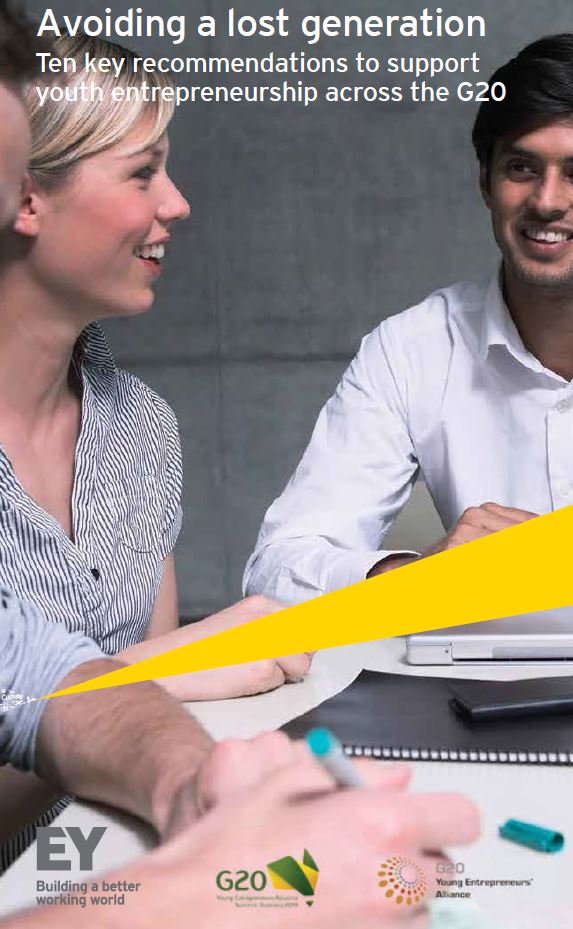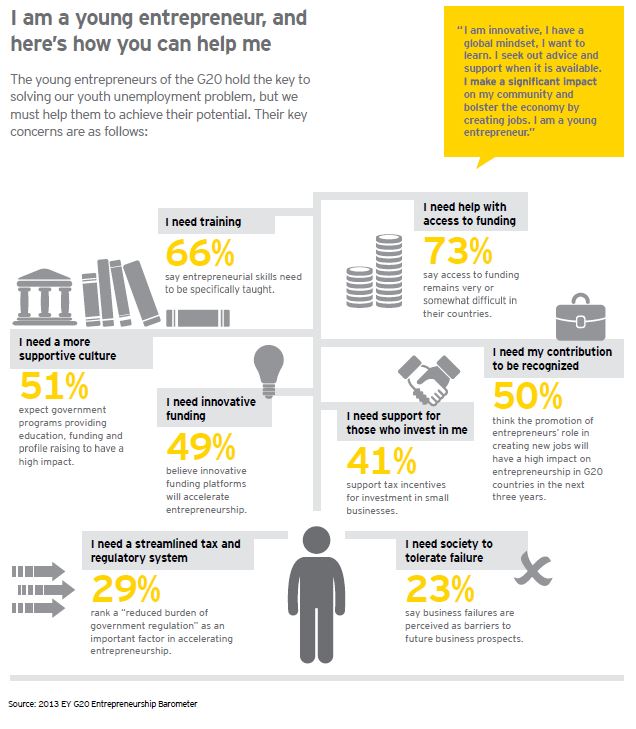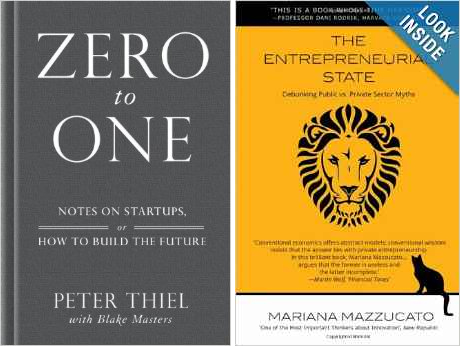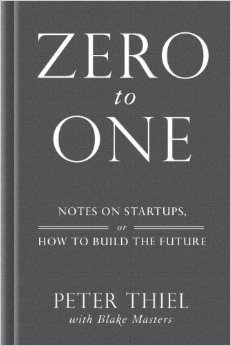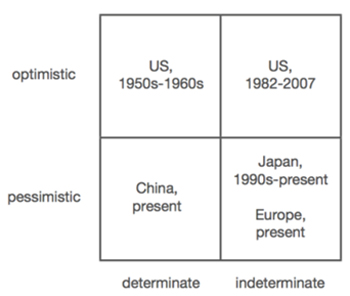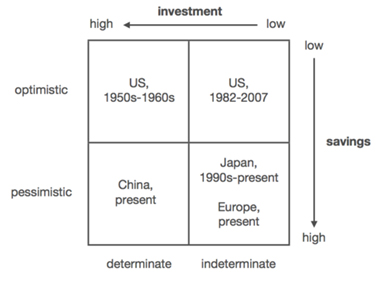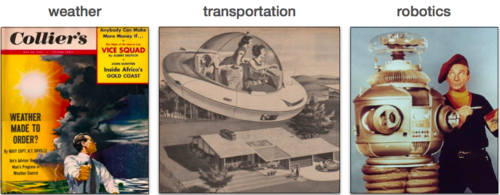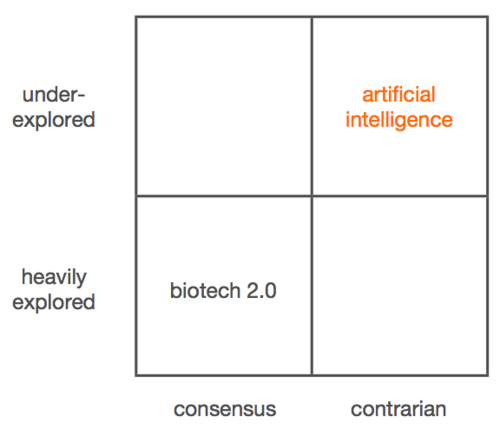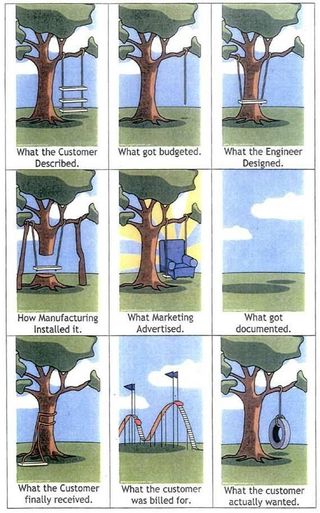I was lucky to present some ideas around entrepreneurship at a Startup event of Institut Pasteur. I did not reinvent the wheel but used quotes of people I have a lot of respect for. Here they are again:
Tag Archives: Culture
Facts, Truth, Courage…
The word Start-up is controversial. Money, business are often the synonymous and at the time of the Paradise Papers, they do not have good press, with reason! I sometimes had to “defend” and I would still defend a world that is important … And more widely, I believe, we must fight to defend the importance of facts and a “dirty word”, truth, with courage. In a world where communication is confused with information (already at the beginning of the 20th century, Schumpeter explained that capitalism could not exist without marketing and advertising) it is important that the voices defending the facts, truth with courage be heard. For this reason, I have sometimes come out of the strict framework of technology, innovation and high-tech entrepreneurship to mention intellectuals who seem important to me. Harari, Piketty, Fleury, Stiegler, Picq.
A long introduction to mention a beautiful interview of Pascal Picq on France Inter this morning: “We must deconstruct male domination in Hollywood as elsewhere.” The link to the site in French is here. A brief excerpt: “Note: the bonobos, who are close to us, have not evolved like us. Homo sapiens is one of the most violent species towards its females, so women. The degrees of this violence vary according to time and culture. The dominant status is exercised with regard to Nature on the one hand, and women on the other hand. The behaviors of male dominance that are rooted in our human societies are the result of a behavioral evolution, and not of a natural and genetic determinism. In the bonobos, the female is dominant, the violence of the relations is mastered by the hedonic relations, and the bonobos live according to a model of gynocracy. The bonobos and the men did not have the same behavioral evolution. And I say that we can not blame our nature, as some do, in the principles of male dominance that have been imposed on humans. It is a behavioral evolution that has become embedded in agricultural societies and industrial societies. Historically, where foods or things are produced, men tend to take control of production and reproduction.”
I should have added that this interview is related to the Oscar granted last night to Agnès Varda for her career and coincidence or not, my previous article in French only – If you do not love me, I can tell you that I do not love you either – dealt with Sandrine Bonnaire, the actress of Agnes Varda in the magnificent Vagabond.
In all disciplines, scientific or not, complexity makes it difficult sometimes, not to say often, to assert truths. They seem sometime to be moving. But there are facts that one must always analyze as honestly as possible with courage and then we can come out with truths. Thanks to these intellectuals who work without dogma and help us understand the world.
And to finish on a “lighter” touch, here are two works by Obey whose artistic fight is magnificent!
Start-Up, a culture of innovation
I just published a very short essay. A summary of my activity in the start-up world: “Almost 10 years ago, I wrote a book entitled Start-up, what we may still learn from Silicon Valley. If I had to do a second edition, I don’t think I’d change much despite all the flaws and blunders of the exercise. Yet one morning in February 2016, I had a look at ten years of supporting start-up entrepreneurs and decided to send again old and also new messages to those that the world of innovation and high-tech entrepreneurship puzzles or interests.”
It is also available in French. If you wish to obtain a pdf copy of the books, just send me an email!
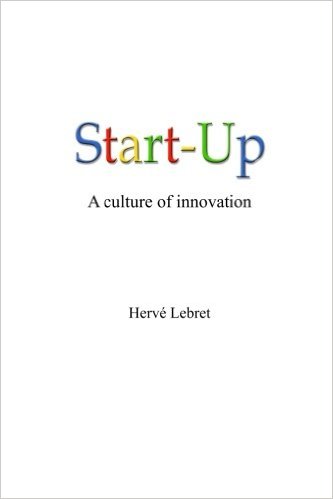 |
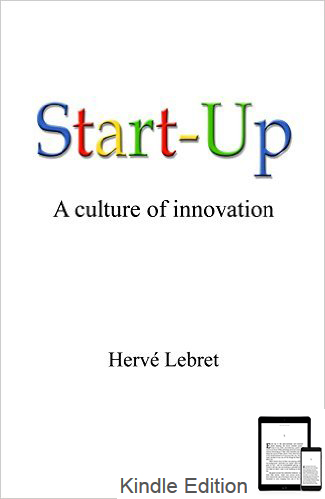 |
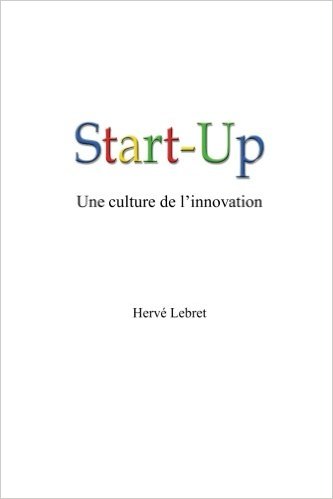 |
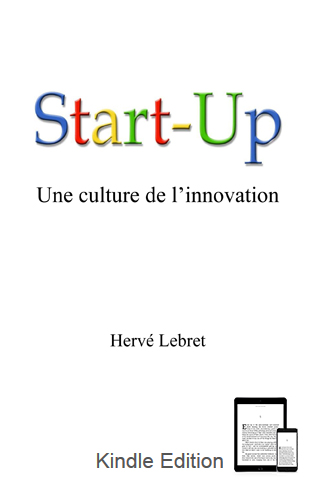 |
The Importance and Difficulty of Culture in Start-ups: Google again…
I confirm I do not like the “how to” books or the ones helping you with recipes, methods. There are exceptions but I always struggle with them. (Same with audio or videos by the way). And same thing about culture. What is it? How do you build it? Here is an element of why it’s tough for me and others: “There are three things they never tell you about culture. First thing is they never tell you anything about culture. No one talks about culture and no one ever tells the need to have strong culture. So there’s tons of articles about building a great product, there’s tons of articles on growth and adaption, and a few things about culture. It’s a mystical thing that’s soft and fuzzy. That’s the first problem. The second problem is it is hard to measure. Things that are hard to measure often get discounted. These are two very hard things. The third thing, the biggest problem, it doesn’t pay off in the short term. If you wanted to start up a company and sell it in one year, the one thing I would tell you to do is fuck up the culture. Just hire people quickly. Culture makes you hire really slowly, makes you deliberate about your decisions that in the near term can slow progress.” This is taken from How to startup a start-up. It’s from Brian Chesky, Founder, Airbnb in class 10.
This being said, there’s a great book about company culture. It’s How Google Works, which I mentioned already in a recent post, Entrepreneurship from First Principles. So let me extract a couple of notes from my reading.
No real businesss plan
“One of the biggest reasons for our success, though, is that the plan we delivered to the board that day in 2003 wasn’t much of a plan at all. There were no financial projections or discussions of revenue streams. There was no market research on what users, advertisers, or partners wanted or how they fit into nicely defined market segments. There was no concept of market research or discussion of which advertisers we would target first. There was no channel strategy or discussion of how we would sell our ad products. There was no concept of an org chart, with sales doing this, product doing that and engineering doing some other that. There was no product roadmap detailing what we would build and when. There was no budget. There were no targets or milestones that the board and company leaders could use to monitor our progress. […] We left that out for the simple reason we didn’t know how we were going to do it. When it came to management tactics, the only thing we could say for sure back then was that much of what [we] had learned in the twentieth century was wrong, and that it was time to start over.” [Page 10]
Smart creative
“The main reason for the lack of business plan is Google population made of Smart Creative. When we contrast the traditional knowledge worker with the engineers and other talented people who have surrounded us at Google over the past decade-plus, we see that our Google peers represent a quite different type of employee. They are no confined to specific tasks. They are not limited in their access to the company’s information and computing power. They are not averse to risk taking, nor are they punished or held back in any way when those risky initiatives fail. They are not hemmed in by role definitions or organizational structures; in fact, they are encouraged to exercise they own ideas. They don’t keep quite when they disagree with something. They get bored easily and shift jobs a lot. They are multidimensional, usually combining technical depth with business savvy and creative flair. In other words, they are not knowledge workers, at least not in the traditional sense. They are a new kind of animal, a type we call a “smart creative,” and they are the key to achieving success in the Internet Century.” [Page 17]
Key attributes of smart creative: expert in doing, comfortable with data, sees a direct line from technical expertise to product excellence to business success, hard-working, understands the user or consumer’s perspective, always questioning, not afraid to fail, self-directed, open, thorough. Communicative, eager and able.
Mentor
“When they learnt all this, they decided to write this book as if they were mentors. Lew Platt, HP’s CEO explained why he was investing so much time to help out a young executive at another company: “This is the way Silicon valley works. We’re here to help you.” Steve Jobs explained that Noyce helped him discover the tricks. Schmidt agrees that “it’s what you learn after you know it all that counts” and he believes “we had a front-row seat and used it to relearn everything we thought we knew about management, i.e. how to grow a business, attract and motivate smart creative, which start with a culture, then strategy. Business plans aren’t as important as the pillars upon which they are built” [Pages 21-23]. Culture stems from founders, but it is best reflected in the trusted team the founders form to launch their venture. [Page 30]
Slogans (believe in them)
– Keep them crowded
– Work, eat and live together
– Messiness is a virtue
– Don’t listen to the HiPPOs (*)
(later there is “your title makes you a manager, your people make you a leader”)
– The rules of seven (hierarchy is not good but flatness neither)
– Do all reorgs in a day
– The Bezos two-pizza rule
– Exile knaves but fight for divas
– Overworked in a good way
– Establish a culture of Yes
– fun, not Fun
– You must wear something
– Ah’cha’rye
– Don’t be evil
(*): Highest Paid Person’s Opinion
Strategy
Bet on technical insights, not market research
Don’t look for faster horses
Optimize for growth
Specialize
Default to open, not closed
Default to open, except when…
Don’t follow competition
The CEO needs to be the CIO (Chief Innovation Officer).
One of the best chapters is the one entitled Innovation. “To us, innovation entails both the production and implementation of novel and useful ideas. Since “novel” is often just a fancy synonym for “new”, we should also clarify that for something to be innovative, it needs to offer new functionality, but it also has to be surprising. If your customers are asking for it, you aren’t being innovative when you give them what they want; you are just being responsive. That’s a good thing, but it’s not innovative. Finally “useful” is a rather underwhelming adjective to describe that innovation hottie, so let’s add an adverb and make it radically useful, Voilà: For something to be innovative, it needs to be new, surprising, and radically useful.” [Page 206]
[NB. These are the 3 criteria for real patentability: novel, non-obvious and applicable]
“But Google also releases over five hundred improvements to its search every year. Is that innovative? Or incremental? They are new and surprising, for sure, but while each one of them, by itself is useful, it may be a stretch to call it radically useful. Put them all together, though, and they are. […] This more inclusive definition – innovation isn’t just about the really new, really big things – matters because it affords everyone the opportunity to innovate, rather than keeping it to the exclusive realm of these few people in that off-campus building [Google[x]] whose job is to innovate.” [Page 206]
And innovation is critical: “A few years ago, a major consulting firm published a report advising all companies to appoint a Chief Innovation Officer. Why? Allegedly to establish a “uniformity of command” over all the innovation programs. We’re not sure what that means, but we’re pretty sure that “uniformity of command“ and “innovation” don’t belong in the same sentence (unless it’s the one you’re reading now). […] Innovation stubbornly resists traditional, MBA-style management tactics. Unlike most other things in business, it cannot be owned, mandated, or scheduled. Innovative people do not need to be told to do it, they need to be allowed to do it“. [Page 209]
If you really do not want to read this very good book, here is an alternative:
PS: a small detail. The last section is about acknowledgements. It is usually boring, here it’s not. Just because it is more than 7 pages with more than 100 names mentioned…
Ten key recommendations to support youth entrepreneurship
I just recieved a very interesting analysis by E&Y and the G20 Young Entrepreneurs’ Alliance (G20 YEA), entitled Avoiding a lost generation: Ten key recommendations to support youth entrepreneurship across the G20. Both their recommendations and what young entrepreneurs look for deserve some attention.
Here are the 10 recommendations:
Access to funding
1- Capital without mentorship is lost capital.
Create funding mechanisms, either government run or government backed, that make mentorship and financial education a condition of funding.
2- Access to alternative funding is critical.
Create strong relationships and provide incentives with venture capitalists (VCs), incubators and business angels to develop or create initiatives that enable alternative sources of capital.
3- Public funding matters.
Sponsor start-up growth with low-cost funding for targeted groups.
4- Entrepreneurs still need banks to keep credit moving.
Create a new class of loan for small businesses and young entrepreneurial firms that offers targeted funding to meet expansion capital needs.
Tax and regulation
5- Targeted tax and business incentives are highly important to supporting young entrepreneurs in scaling their businesses.
5a-: Encourage investment in start-ups by offering tax benefits.
5b-: Enable young, high-growth entrepreneurial firms to scale up through amplified support for market access.
6- Support global mobility for young entrepreneurs.
Encourage top international talent by changing visa rules and offering funding support.
7- Complex and burdensome rules in areas such as tax hold back young entrepreneurs.
Simplify and streamline tax administration to ease administrative burdens on young entrepreneurs.
Entrepreneurship culture
8- Positive mainstream views about entrepreneurship are needed to attract young people.
Create a positive narrative around entrepreneurship to help engage young people from an early age.
9- Encourage a national, regional and local culture of entrepreneurship.
Encourage and foster hubs, incubators, accelerators and networks to bring relevant talent together.
Developing an entrepreneurial ecosystem
10-For many of the recommendations and actions to have sustainable impact they need to work as part of a regional ecosystem, and within a regional ecosystem framework that fosters and attracts a critical mass of talent, capital and most importantly entrepreneurial leaders.
Create the foundation for a regional entrepreneurial ecosystem to flourish.
And nearly as interesting is the perception from the entrepreneurs. Just notice that the priorities are not emphasized in the same order. We see that tax is not their main problem, an intuition that I always had.
When Peter Thiel talks about Start-ups – Final Thoughts: Human After All
As you noticed if you read my previous posts, I’ve been quite impressed by Peter Thiel’s notes about start-ups. I’ve written 7 long parts. I had been similarly impressed by Mariana Mazzucato’s The Entrepreneurial State even if with only 5 posts!
I said it already, I would have loved to attend their debate in a few days at the conference Human After All, Toronto 2014. But apparently they do not participate to the same roundtable anymore… (After reading what follows, I see that Taleb would have been a great addition).
– He will discuss “The Economics of Radical Uncertainty.”
How do human beings truly react when confronted with conditions of genuine “unknown unknowns”? According to Frank Knight, “Uncertainty must be taken in a sense radically distinct from the familiar notion of risk, from which it has never been properly separated…The essential fact is that ‘risk’ means in some cases a quantity susceptible of measurement, while at other times it is something distinctly not of this character; and there are far – reaching and crucial differences in the bearings of the phenomena depending on which of the two is really present and operating… It will appear that a measurable uncertainty, or ‘risk’ proper, as we shall use the term, is so far different from an unmeasurable one that it is not in effect an uncertainty at all.” The economics literature from Knight onward is very good at laying out the propensity of markets to greatly overshoot and undershoot the fundamentals. However, economics does not adequately address the implications of “Knightean” uncertainty, because the discipline finds it hard to model this phenomenon. To get a full measure of this, one has to enter into the realm of psychology and neuroscience. That’s where the definition lies. Radical uncertainty, like so much else, is too important to be left to the realm of economics alone.
– She will be part of “Innovation: Do Private Returns Produce the Social Returns We Need?”
The machines of the first age replaced and multiplied the physical labour of humans and animals. The machines of the second age will replace and multiply our intelligence. The driving force behind this revolution will, argue the “techno-positivists,” exponentially increase the power (or exponentially reduce the cost) of computing. The celebrated example is Moore’s Law, named after Gordon Moore, a founder of Intel. For half a century, the number of transistors on a semiconductor chip has doubled at least every two years. But the information age has coincided with – and must, to some extent, have caused – adverse economic trends: stagnation of median real incomes; rising inequality of labour income and of the distribution of income between labour and capital; and growing long – term unemployment. Are the great gains in
wealth and material prosperity created by our entrepreneurs in and of themselves sufficient to produce desired social returns demanded in today’s world?
Start-ups are a great area to study the tension between individuals and society. A kind of chicken and egg situation… Indeed they might explain the growing gap between the USA and Europe in many dimensions. Mazzucato would be on the social side, Thiel closer to the individual. But do not see any provocative statement here. The thoughts of Thiel and Mazzucato are profound. I agree with most of what they say, disagree with smaller pieces, though most people could think their thinking can not be reconciled. I really think that combining their point of views is an interesting approach to what innovtaion really is…
PS (May 8, 2014): I just found that video of Thiel at SXSW.
When Peter Thiel talks about Start-ups – part 7: luck & uncertainty
This is my last post about Thiel’s class notes at Stanford and it is about Class 13 – Luck. Now I need to wait for his book to be published…
I love accidents. I mentioned it in a post which has nothing to do with start-ups (related to Street Art). The accident here is funny: I totally forgot to copy-paste Thiel’s class 13 and it is only when I began to read class 14 that I noticed my mistake. Now let me quote Thiel: “Note that this is class 13. We are not going to be like the people who build buildings without a 13th floor and superstitiously jump from class 12 to 14. Luck isn’t something to circumvent or be afraid of. So we have class 13. We’ll dominate luck.” Strange, right? I had to call this final part, part 7…
So what does Thiel say about luck? Well it is a debated topic, as I experienced in my activity at EPFL. Thiel feels the same. He begins with: “The biggest philosophical question underlying startups is how much luck is involved when they succeed. As important as the luck vs. skill question is, however, it’s very hard to get a good handle on. Statistical tools are meaningless if you have a sample size of one. It would be great if you could run experiments. Start Facebook 1,000 times under identical conditions. If it works 1,000 out of 1,000 times, you’d conclude it was skill. If it worked just 1 time, you’d conclude it was just luck. But obviously these experiments are impossible.” adding the famous Thomas Jefferson’s line: “I’m a great believer in luck, and I find the harder I work the more I have of it.”
Thiel is not so much interested in luck as in determinism vs. indeterminism. “If you believe that the future is fundamentally indeterminate, you would stress diversification. […]. If the future is determinate, it makes much more sense to have firm convictions. […] Overlay this diversification/conviction dynamic over the optimism/pessimism question and you get further refinement. Whether you look forward to the future or are afraid of it ends up making a big difference. And here is his vision of the world:
With an even more surprising and quite convincing:
“But the indeterminate future is somehow one in which probability and statistics are the dominant modality for making sense of the world. Bell curves and random walks define what the future is going to look like. The standard pedagogical argument is that high schools should get rid of calculus and replace it with statistics, which is really important and actually useful. There has been a powerful shift toward the idea that statistical ways of thinking are going to drive the future.”
But here I’d love to ask Peter Thiel what he makes of Black Swans if he believes in 0 to 1 more than in 1 to n. 1 to n belongs to statistics, not 0 to 1… (read again my part 1 if this is cryptic)
Thiel likes crazy ideas, like Reber’s project for the Bay Area in the 1940s above. He also still believes in finance despite its excesses: “In a future of definite optimism, you get underwater cities and cities in space. In a world of indefinite optimism, you get finance. The contrast couldn’t be starker. The big idea in finance is that the stock market is fundamentally random. It’s all Brownian motion. All you can know is that you can’t know anything. It’s all a matter of diversification. There are clever ways to combine various investments to get higher returns and lower risk, but you can only push out the efficient frontier a bit. You can’t know anything substantive about any specific business. But it’s still optimistic; finance doesn’t work if you’re pessimistic. You have to assume you’re going to make money. […] Indeterminacy has reoriented people’s ideas about investing. Whereas before investors actually had ideas, today they focus on managing risk. Venture capital has fallen victim to this too. Instead of being about well-formed ideas about future, the big question today is how can you get access to good deals. In theory at least, VC should have very little in common with such a statistical approach to the future.“
And he might agree with Mariana Mazzucato during his debate to come with her (at Human After All, Toronto 2014 – program in pdf) : “The size of government hasn’t changed all that much in the last 40-50 years. But what the government actually does has changed radically. In the past, the government would get behind specific ideas and execute them. Think the space program. Today, the government doesn’t do as many specific things. Mainly it just shifts money around from some people to other people. What do you do about poverty? Well, we don’t know. So let’s just give people money, hope it helps, and let them figure it out.”
Darwinism and design.
And all of a sudden, while reading this class 13, Thiel again surprises me! Obviously, the indeterminate optimism can be quite easily linked to Darwin’s theory of evolution. Accidents happen, but there is general positive evolution. And “Applied to start-ups, obsession with indeterminacy leads to the following phenomena:
• Darwinistic A/B testing
• Iterative processes
• Machine learning
• No thinking about the future
• Short time horizons”
Typical Blank’s messages! But Thiel envisages another possibility: “Apple is absolute antithesis of finance. It does deliberate design on every level. There is the obvious product design piece. The corporate strategy is well defined. There are definite, multi-year plans. Things are methodically rolled out.” (I do not think Thiel talks here about intelligent design which is opposed to Darwinian theory, but the coincidence is a little puzzling!
“On the heels of Apple has come the theme of well-designed products being really important. Airbnb, Pinterest, Dropbox, and Path all have a very anti-statistical feel. […] That link—great design—seems to work better and faster than Darwinistic A/B testing or iteratively searching through an incredibly large search space. The return of design is a large part of the countercurrent going against the dominating ethos of indeterminacy. Related to this is the observation that companies with really good plans typically do not sell. If your startup gets traction, people make offers to buy it. In an indefinite world, you will take the money and sell, because money is what you want. […] But when companies have definite plans, those plans tend to anchor decisions not to sell.[..] In an indefinite world, investors will value secret plans at zero. But in a determinate world, robustness of the secret plan is one of the most important metrics […] It’s important to note that you can always form a definite plan even in the most indefinite of worlds. […] We’re falling downwards towards pessimism. Can we shift instead to definite optimism?”
This is the end of my notes on Thiel’s great vision about start-ups.
When Peter Thiel talks about Start-ups – part 6: founder uniqueness, technology singularity
Thiel’s concludes his Class Notes Essays (CS183 —Stanford, Spring 2012) with philosophical considerations about the uniqueness of founders (class 18) and the singularity of technology (class 19). Founders are a topic I regularly covered, for example with European Founders at Work or Founders at Work.
Again Thiel presents unusual ideas about founders. He sees them as a combination of extreme outsiders and extreme insiders.
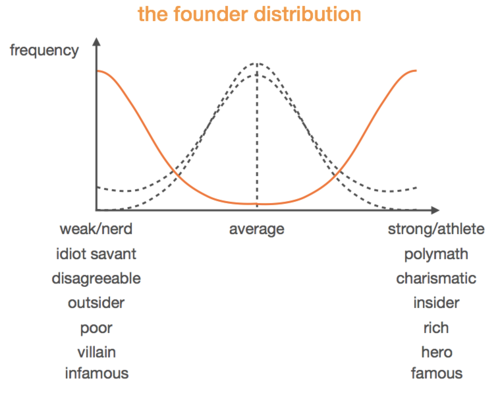
which he reinforces with this virtuous/vicious circle:
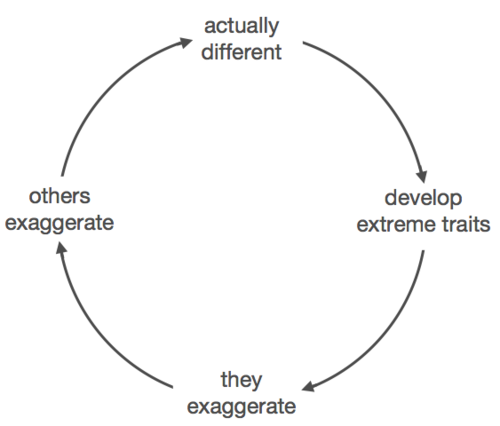
If this is not clear, two examples may help:
– “All [these] questions apply to Gates. Was it nature or nurture? He was a Harvard insider but a dropout outsider. He wore big glasses. Did he become a nerd unwillingly? Did he prosper by accentuating his nerdiness? It’s hard to tell.”
– “And then there’s the Steve Jobs version. […] He had all the classic extreme outsider and extreme insider traits. He dropped out of college. He was eccentric and had all these crazy diets. He started out phreaking phones with Steve Wozniak. He took LSD.”
Thiel is convincing when he explains that a start-up is not a democracy. Founders are Kings, and Thiel may have followed René Girard at Stanford since he then develops a theory of scapegoats. The god may become a victim.
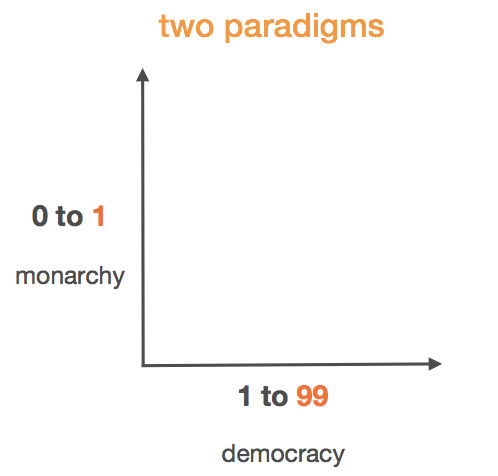
Thiel is a little short about the dual-founder situation: “The dual founder thing is worth mentioning. Co-founders seem to get in a lot less trouble than more unbalanced single founders. Think Hewlett and Packard, Moore and Noyce, and Page and Brin. There are all sorts of theoretical benefits to having multiple founders such as more brainstorming power, collaboration, etc. But the really decisive difference between one founder and more is that with multiple founders, it’s much harder to isolate a scapegoat. Is it Larry Page? Or is it Sergey Brin? It is very hard for a mob-like board to unite against multiple people—and remember, the scapegoat must be singular. The more singular and isolated the founder, the more dangerous the scapegoating phenomenon. For the skeptic who is inclined to spot fiction masquerading as truth, this raises some interesting questions. Are Page and Brin, for instance, really as equal as advertised? Or was it a strategy for safety? We’ll leave those questions unanswered and hardly asked.”
Thiel’s vision (as well as the visions of his guests – I mixed them here) of technology was mentioned in my previous post. Again quite fascinating. “People do tend have some view of the future. They usually project relative stagnation. People tend to believe that, not only will most things not change, but what will change won’t change very quickly.” But “there’s a compelling case that we’ll very likely see extraordinary or accelerated progress in the decades ahead.”
One guest: “My take is that innovation comes from two places: top-down and bottom-up. There’s a huge DIY community. These hobbyists are working in labs they set up in their kitchens and basements. On the other end of the spectrum you have DARPA spending tons of money. Scientists are talking to each other from different countries, collaborating. All this interconnectedness matters. All these interactions in the aggregate will bring the change.
Another guest: “I disagree. There are a very few visionary people who can make a real difference at the formative early stage. This is why mainstream opinion formers are absolutely pivotal. Perhaps no other subset of people could do more to further radical technology. By overpowering public reluctance and influencing the discourse, these people can enable everyone else to build the technology. If we change public thinking, the big benefactors can drive the gears.”
The third guest: “I do not think that progress will come from the top-down or from the bottom-up, really. Individual benefactors who focus on one thing, like Paul Allen, are certainly doing good. But they’re not really pushing on future; they’re more pushing on individual thread in homes that it will make the future come faster. The sense is that these people are not really coordinating with each other. Historically, the big top-down approaches haven’t worked. And the bottom-up approach doesn’t usually work either. It’s the middle that makes change—tribes like the Quakers, the Founding Fathers, or the Royal Society. These effective groups were dozens or small hundreds in size. It’s almost never lone geniuses working solo. And it’s almost never defense departments or big institutions. You need dependency and trust. Those traits cannot exist in one person or amongst thousands.”
Peter Thiel: “That’s three different opinions on who makes the future: a top-down bottom-up combo, social opinion molders, and tribes.”
To be honest, I was more convinced with his analysis of founders than of technologies. His conclusion is worth reading as inspiration: “This course has largely been about going from 0 to 1. We’ve talked a lot about how to create new technology, and how radically better technology may build toward singularity. But we can apply the 0 to 1 framework more broadly than that. There is something importantly singular about each new thing in the world. There is a mini singularity whenever you start a company or make a key life decision. In a very real sense, the life of every person is a singularity. The obvious question is what you should do with your singularity. The obvious answer, unfortunately, has been to follow the well-trodden path. You are constantly encouraged to play it safe and be conventional. The future, we are told, is just probabilities and statistics. You are a statistic. But the obvious answer is wrong. That is selling yourself short. Statistical processes, the law of large numbers, and globalization—these things are timeless, probabilistic, and maybe random. But, like technology, your life is a story of one-time events. By their nature, singular events are hard to teach or generalize about. But the big secret is that there are many secrets left to uncover. There are still many large white spaces on the map of human knowledge. You can go discover them. So do it. Get out there and fill in the blank spaces. Every single moment is a possibility to go to these new places and explore them. There is perhaps no specific time that is necessarily right to start your company or start your life. But some times and some moments seem more auspicious than others. Now is such a moment. If we don’t take charge and usher in the future—if you don’t take charge of your life—there is the sense that no one else will. So go find a frontier and go for it. Choose to do something important and different. Don’t be deterred by notions of luck, impossibility, or futility. Use your power to shape your own life and go and do new things.”
Reading these last lines, I remembered the conclusion of my book: “And I suddenly remembered an essay by Wilhelm Reich, the great psychoanalyst, which he wrote in 1945: “Listen, Little Man”. A small essay by the number of pages, a big one in the impact it creates. “I want to tell you something, Little Man; you lost the meaning of what is best inside yourself. You strangled it. You kill it wherever you find it inside others, inside your children, inside your wife, inside your husband, inside your father and inside your mother. You are little and you want to remain little.” The Little Man, it’s you, it’s me. The Little Man is afraid, he only dreams of normality; it is inside all of us. We hide under the umbrella of authority and do not see our freedom anymore. Nothing comes without effort, without risk, without failure sometimes. “You look for happiness, but you prefer security, even at the cost of your spinal cord, even at the cost of your life”.
When Peter Thiel talks about Start-ups – part 5: a vision of the future of technology
I am still not sure how Thiel’s class notes on start-ups will finish, but they are more and more fascinating, class after class. At least his vision of this world is.
Class 14 is about cleantech and energy. “Alternative energy and cleantech have attracted an enormous amount of investment capital and attention over the last decade. Almost nothing has worked as well as people expected. The cleantech experience can thus be quite instructive. […] To think about the future of energy, we can use the [another] matrix. The quadrants shake out like this:
– Determinate, optimistic: one specific type of energy is best, and needs to be developed
– Determinate, pessimistic: no technology or energy source is considerably better. You have what you have. So ration and conserve it.
– Indeterminate, optimistic: there are better and cheaper energy sources. We just don’t know what they are. So do a whole portfolio of things.
– Indeterminate, pessimistic: we don’t know what the right energy sources are, but they’re likely going to be worse and expensive. Take a portfolio approach.”
Both for energy and transportation, Thiel’s fills his quadrants with interesting examples:
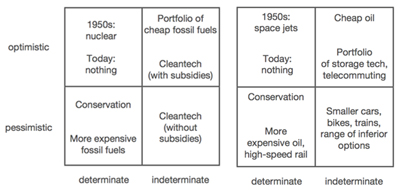
and he adds: “Petroleum has dominated transportation. Coal has dominated in power generation. […] Typically a single source dominates at any given time. There is a logical reason for this. It doesn’t make sense that the universe would be ordered such that many different kinds of energy sources are almost exactly equal. Solar is very different from wind, which is very different from nuclear. It would be extremely odd if pricing and effectiveness across all these varied sources turned out to be virtually identical. So there’s a decent ex ante reason why we should expect to see one dominant source. This can be framed as a power law function. Energy sources are probably not normally distributed in cost or effectiveness. There is probably one that is dramatically better than all others.”
But the analysis explaining the cleantech bubble were far from clear. “One problem was that people were ambiguous on what was scarce or problematic. Was there resource scarcity? Or were the main problems environmental?” […] “To have a successful startup, you must have good answers—or at least a good plan for getting those answers.” Answers to many issues such as
– the market
– the secrets
– the team and its culture
– the funding
and unfortunately many mistakes were made.
Regarding the market, there was the issue of both explaining how to become a leader of one segment (PV, wind,…) and why a segment was better. Regarding the secret: “If you want to start a company, you should have some important secret. But in practice, most wind, solar, and cleantech ventures relied on incremental improvements.” Even worse, “most cleantech companies in the last decade have had shockingly non-technical teams and cultures. Culture defaulted toward zero-sum competition. Savvy observers would have seen the trouble coming when cleantech people started wearing suits and ties. Tech people and computer people wear t-shirts and jeans. Cleantech people, by contrast, looked like salesmen. And indeed they were. This is not a trivial point. If you’re dealing in something that’s incremental and of questionable durability, you actually have to be a really good salesman to convince people that it’s dramatically better.” Finally “a good, broad rule of thumb is to never invest in companies who are looking for less than $1 million or more than $1 billion. If companies can do everything they want for less than a million dollars, things may be a little too easy. There may be nothing that is very hard to build, and it’s just a timing game. On the other extreme, if a company needs more than a billion dollars to be successful, it has to become so big that the story starts to become implausible.”
If Thiel were to bet on soemthing, it would apparently be Thorium as a nuclear fuel.
Class 15 is about other future bets.
Thiel is a strong believer in contrarian (and sometimes huge) bets. He is interested in or at least puzzled by transportation, robotics, weather and energy storage. And his way of choosing is to look at what did not work (yet) in the past: “Various VC firms in Silicon Valley warned expressed concern about [investing in unique technologies]. They warned us that investing in SpaceX was risky and maybe even crazy. And this wasn’t even at the very early stage. […] (Danielle Fong:) People like to act like they like being disruptive and taking risks. But usually it’s just an act. They don’t mean it. Or if they do, they don’t necessarily have the clout within the partnership to make it happen. (Peter Thiel:) It is very hard hard for investors to invest in things that are unique. The psychological struggle is hard to overstate. People gravitate to the modern portfolio approach. The narrative that people tell is that their portfolio will be a portfolio of different things. But that seems odd. Things that are truly different are hard to evaluate. […] The upside to doing something that you’re unfamiliar with, like rockets, is that it’s likely that no one else is familiar with it, either. The competitive bar is lowered. You can focus on learning and substantive things over process, which is perhaps better than competing against experts.”
Class 16 is about maybe the highest of all bets: life and death.
I have not so far mentioned the sentence which comes at the top of each series of class notes: “Your mind is software. Program it. Your body is a shell. Change it. Death is a disease. Cure it. Extinction is approaching. Fight it.”
The problem.
“Like death itself, modern drug discovery is probably too much a matter of luck. Scientists start with something like 10,000 different compounds. After an extensive screening process, those 10,000 are reduced to maybe 5 that might make it to Phase 3 testing. Maybe 1 makes it through testing and is approved by the FDA. It is an extremely long and fairly random process. This is why starting a biotech company is usually a brutal undertaking. Most last 10 to 15 years. There’s little to no control along the way. What looks promising may not work. There’s no iteration or sense of progress. There is just a binary outcome at end of a largely stochastic process. You can work hard for 10 years and still not know if you’ve just wasted your time.
To be fair, we must acknowledge that all the luck-driven, stats-driven processes that have dominated people’s thinking have worked pretty well over the last few decades. But that doesn’t necessarily mean that indeterminacy is sound practice. Its costs may be rising quickly. Perhaps we’ve found everything that is easy to find. If so, it will be hard to improve armed with nothing but further random processes. This is reflected in escalating development costs. It cost $100 million to develop a new drug in 1975. Today it costs $1.3 billion. Probably all life sciences investment funds have lost money. Biotech investment has been roughly as bad a cleantech.”
The perspectives.
“Drug discovery is fundamentally a search problem. The search space is extremely big. There are lots of possible compounds. An important question is thus whether we can use computer technology to reduce scope of luck. Can Computer Science make biotech more determinative?”
“These are big secrets that play out over long time horizons, not web apps that have a 6-week window to take over the world.”
“The sequencing of the genome is like the first packets being sent over ARPANET. It’s a proof of concept. This technology is happening, but it isn’t yet compelling. So there is a huge market if one can make something compelling enough for people to actually go and get a genome sequenced. It’s like e-mail or word processing. Initially these things were uncomfortable. But when they become demonstrably useful, people leave their comfort zones and adopt them.”
“Biotech got quite a burst in late 70s early 80s, with new recombinant DNA and molecular biology techniques. Genentech led the way from the late 70s to the early 80s. Nine of the 10 biggest American biotech companies were founded during this really short time. Their technology came out some 7-8 years later. And that was the window; not very many integrated biotech companies have emerged since then. There was a certain amount of stuff to find. People found it. And before Genentech, the paradigm was pharma, not biotech. That window (becoming an integrated pharmaceutical company) had been closed for about 30 years before Genentech. So the bet is that while the traditional biotech window may be closed, the comp bio window is just opening.”
“There’s really no rush to spill the secret plans. This space is very much unlike fast-moving consumer Internet startups. Here, if you have something unique, you should nurse it.”
“Slow iteration is not law of nature. Pharma and biotech usually move very slowly, but both have moved pretty fast at times. From 1920-1923 Insulin moved at the speed of software. Today, platforms like Heroku have greatly reduced iteration times. The question is whether we can do that for biotech. Nowhere is it written in stone that you can’t go from conception to market in 18 months. That depends very much on what you’re doing. Genentech was founded the same year as Apple was, in 1976. Building a platform and building infrastructure take time. There can be lots of overhead. Ancillary things can take longer than a single product lifecycle to accumulate. [… the] VC is broken with respect biotech. Biotech VCs have all lost money. They usually have time horizons that are far too short. VCs that say they want biotech tend to really want products brought to market extremely quickly. “Integrated drug platform” is an ominous phrase for VCs. More biotech VCs are focused on globalization than on real technical innovation. VCs typically found a company around a single compound and then pour a bunch of money into it to push it through the capital-intensive trial process. Most VCs not interested in multi-compound companies doing serious pre-clinical research.”
And as a conclusion of class 16, “Startups are always hard at the start. There are futons and ironing boards in the office. You have to rush to clean up for meetings. But maybe the hardest thing is just to get your foundation right and make sure you plan to build something valuable. You don’t have to do a science fair project at the start. You just have to do your analytical homework and make sure what you’re doing is valid. You have to give yourself the best chance of success as things unfold in the future.”
Class 17 is about the brain, artificial intelligence, maybe the last frontier in technology, certainly going further than the previous topics addressed here.
Not much more to add except maybe the short description of the approach by 3 start-ups:
– Vicarious is trying to build AI by develop algorithms that use the underlying principles of the human brain. They believe that higher-level concepts are derived from grounded experiences in the world, and thus creating AI requires first solving a human sensory modality.
– Prior Knowledge (acquired by Salesforce since Thiel’s class) is taking a different approach to building AI. Their goal is less to emulate brain function and more to try to come up with different ways to process large amounts of data. They apply a variety of Bayesian probabilistic techniques to identifying patterns and ascertaining causation in large data sets. In a sense, it’s the opposite of simulating human brains.
– The big insight at Palantir (…) isn’t regression analysis, where you look at what was done in the past to try to predict what’s going to be next. A better approach is more game theoretic. Palantir’s framework is not fundamentally about AI, but rather about intelligence augmentation.
And one more comment: “For the most part, academics aren’t (working on strong AI or crazy things) because their incentive structure is so weird. They have perverse incentive to make only marginally better things. And most private companies aren’t working on it because they’re trying to make money now.(…) Bold claims also require extraordinary proof. If you’re pitching a time machine, you’d need to be able to show incremental progress before anyone would believe you. Maybe your investor demo is sending a shoe back in time. That’d be great. You can show that prototype, and explain to investors what will be required to make the machine work on more valuable problems. It’s worth noting that, if you’re pitching a revolutionary technology as opposed to an incremental one, it is much better to find VCs who can think through the tech themselves. When Trilogy was trying to raise their first round, the VCs had professors evaluate their approach to the configurator problem. Trilogy’s strategy was too different from the status quo, and the professors told the VCs that it would never work. That was an expensive mistake for those VCs. When there’s contrarian knowledge involved, you want investors who have the ability to think through these things on their own.”
End of part 5!
When Peter Thiel talks about Start-ups – part 4: it’s customer, stupid!
Thiel’s classes 9 to 12 leave the pure field of start-ups to the higher levels of economy, business and innovation. Thiel gives general advice such that customers are important and more important than competitors with the recurring “obsession” that peace and correlated monopoly are better than war and deadly competition.
Class 9 is about customers and more specifically how to find them. “People say it all the time: this product is so good that it sells itself. This is almost never true. […] The truth is that selling things is not a purely rational enterprise. There is much stranger stuff at work here. […] Most engineers underestimate the sales side of things because they are very truth-oriented people. In engineering, something either works or it doesn’t. […] Engineering is transparent. […] Sales isn’t very transparent at all. (As a side comment, I advise again to read Packer about transparency and politics in SV, in fact look at what follows!) […] A good analogy to the engineer vs. sales dynamic is experts vs. politicians. If you work at a big company, you have two choices. You can become expert in something. The other choice is to be a politician. […] The really good politicians are much better than you think. Great salespeople are much better than you think. But it’s always deeply hidden. In a sense, probably every President of the United States was first and foremost a salesman in disguise.
Thiel loves quadrants but does not draw one here, he just explains it:
– Product sells itself, no sales effort. Does not exist.
– Product needs selling, no sales effort. You have no revenue.
– Product needs selling, strong sales piece. This is a sales-driven company.
– Product sells itself, strong sales piece. This is ideal.
Thiel has similar views on marketing “Advertising is tricky in the same way that sales is” and he uses the famous quote: “Half the money I spend on advertising is wasted: the trouble is I don’t know which half.” Sales follow a power law similar to the one existing in value creation. Viral marketing rarely works… and viral marketing requires that the product’s core use case must be inherently viral.
In his class 10, Thiel begins to explore the future and shows how difficult it is to identify opportunities. He even mentions the nice quote (but never said in reality) “everything that can be invented has been invented” (falsely) attributed to U.S. Patent Commissioner Charles H. Duell in 1899. Again both in terms of technology innovation (vs. computers) or globalization (vs. China), he advises not to compete but to collaborate.
But the worst competitor is time… “More interesting are cases where people are right about the future and just wrong on timing. […]And being too early is a bigger problem for entrepreneurs than not being correct. It’s very hard to sit and just wait for things to arrive. It almost never works.” Andreessen who was Thiel’s guest approved: “For entrepreneurs, timing is a huge risk. You have to innovate at the right time. You can’t be too early. This is really dangerous because you essentially make a one-time bet. It’s rare are to start the same company five years later if you try it once and were wrong on timing. Jonathan Abrams did Friendster but not Facebook.”
And Andreessen also agrees about sales: “The number one reason that we pass on entrepreneurs we’d otherwise like to back is focusing on product to the exclusion of everything else. We tend to cultivate and glorify this mentality in the Valley. We’re all enamored with lean startup mode. Engineering and product are key. There is a lot of genius to this, and it has helped create higher quality companies. But the dark side is that it seems to give entrepreneurs excuses not to do the hard stuff of sales and marketing. Many entrepreneurs who build great products simply don’t have a good distribution strategy. Even worse is when they insist that they don’t need one, or call no distribution strategy a viral marketing strategy.”
Again about timing: “You can go wrong in a few ways. One is that the future is too far away […] It’s like surfing. The goal is to catch a big wave. If you think a big wave is coming, you paddle really hard. Sometimes there’s actually no wave, and that sucks. But you can’t just wait to be sure there’s a wave before you start paddling. You’ll miss it entirely. You have to paddle early, and then let the wave catch you. The question is, how do you figure out when the next big wave is likely to come?”
A few not related topics:
– You need to find the balance that lets you think about patents least. It’s basically a distracting regulatory tax.
– What’s ideal is to have a founder/CEO who is a product person. Sales operators handle the sales force. Larry Ellison [is no exception and] is a product guy.
– Being CEO is a learnable skill. With the “world class” CEO model, you miss out on Microsoft, Google, and Facebook. The CEOs of those companies, of course, turned out to be excellent. But they were also the product people who built the companies. [Do not misunderstand] everybody thinks management is a bunch of idiots, and that engineers must save the day by doing the right things on the side. That’s not right. Management is extremely important. Great management and a great product person running the company is characteristic of the very best companies.
Class 11 is also about the future, but in terms of “secrets” which may be important to know how to identify real opportunities: “Some secrets are small and incremental. Others are very big. The focus should be on the secrets that matter: the big secrets that are true. The big ones so far have involved monopoly vs. competition, the power law, and the importance of distribution. “Capitalism and competition are antonyms.” That is a secret; it is an important truth, and most people disagree with it.”
Thiel explains why secrets are important: “Four primary things have been driving people’s disbelief in secrets.
– First is the pervasive incrementalism in our society. People seem to think that the right way to go about doing things is to proceed one very small step at a time. […] Academics are incented by volume, not importance. The goal is to publish lots of papers, each of which is, in practice at least, new only in some small incremental way. […]
– Second, people are becoming more risk-averse. People today tend to be scared of secrets. They are scared of being wrong. Of course, secrets are supposed to be true. But in practice, what’s true of all secrets is that there is good chance they’re wrong. If your goal is to never make mistake in your life, you should definitely never think about secrets. Thinking outside the mainstream will be dangerous for you. […]
– Third is complacency. There’s really no need to believe in secrets today. Law school deans at Harvard and Yale give the same speech to incoming first year students every fall: “You’re set. You got into this elite school. […]
– Finally, some pull towards egalitarianism is driving us away from secrets. We find it increasingly hard to believe that some people have important insight into reality that other people do not. Prophets have fallen out of fashion. Having visions of the future is seen as crazy. In 1939 Einstein sent a letter to President Roosevelt urging him to get serious about nuclear power and atomic weaponry. Roosevelt read it and got serious. Today, such a letter would get lost in the White House mailroom.”
But… “There is no straightforward formula that can be used to find secrets.”
Class 12 is about war and peace again, but I do not have much to comment here except a quote from Reid Hoffman: “A side note on invention and innovation: when you have an idea for a startup„ consult your network. Ask people what they think. Don’t look for flattery. If most people get it right away and call you a genius, you’re probably screwed; it likely means your idea is obvious and won’t work. What you’re looking for is a genuinely thoughtful response. Fully two thirds of people in my network thought LinkedIn was stupid idea. These are very smart people. They understood that there is zero value in a social network until you have a million users on it. But they didn’t know the secret plans that led us to believe we could pull it off. And getting to the first million users took us about 460 days. Now we grow at over 2 users per second.” Peaceful secrets are safer than competing for known things.




